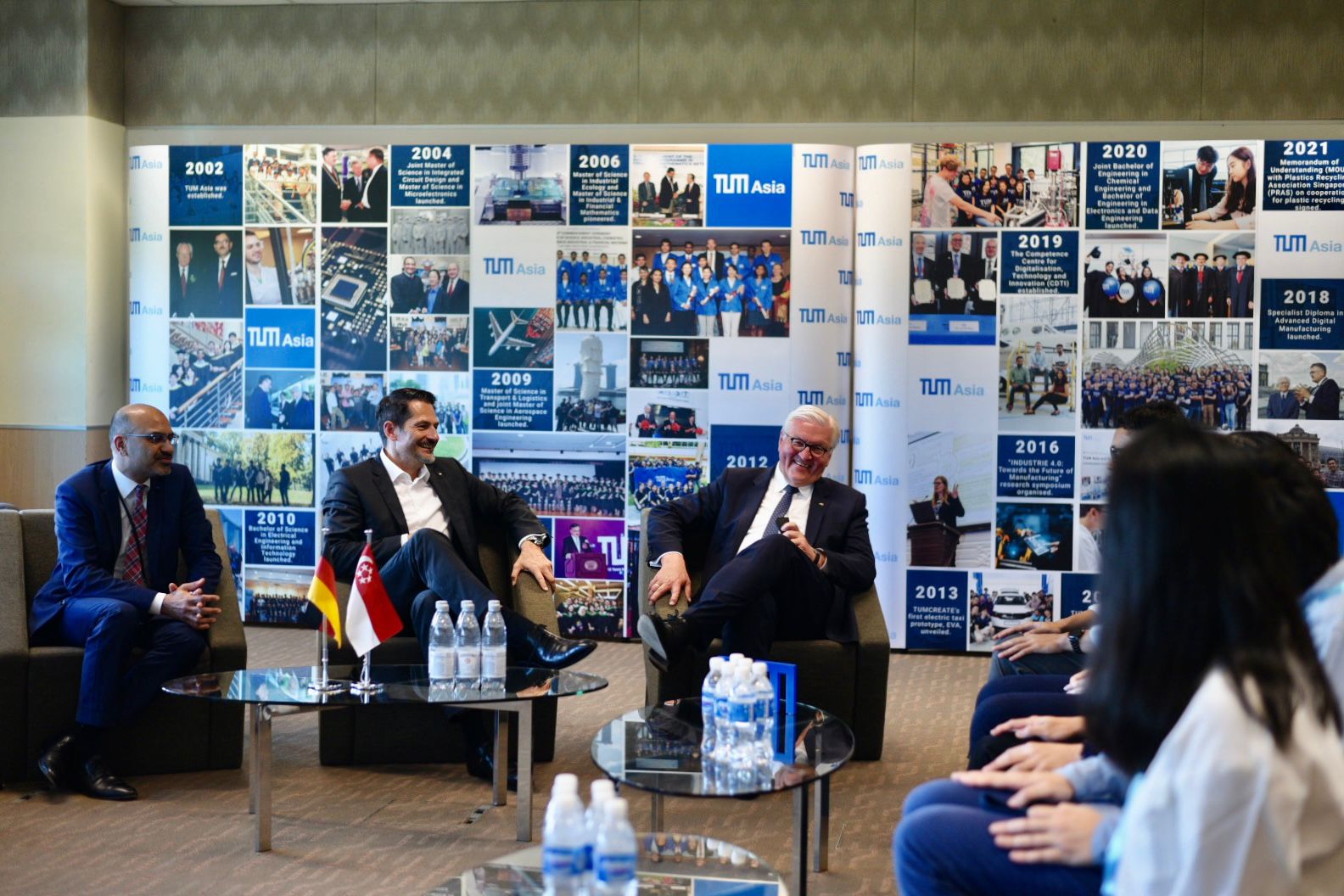
To commemorate its 20 successful years in Singapore, TUM Asia lined up a series of celebrations, culminating in an exclusive visit by the President of the Federal Republic of Germany, President Frank-Walter Steinmeier, to its Singapore campus.
TUM Asia remains the only German university to have an overseas presence in Singapore, capitalising on Singapore’s innovation excellence to equip students with twin perspectives from Germany and Singapore.
Since its establishment in 2002 with just 20 students in its first postgraduate programme – Master of Science in Industrial Chemistry – TUM Asia has grown with more than 2,000 graduates coming through its doors, plying their trades in top research institutes and multinationals to find respective footholds in various arenas.
Evolving from its roots of providing academic excellence in engineering, TUM Asia is spearheading research programmes in mobility and nurturing future leaders in the areas of food sustainability.
Tuesday, 14 June 2022 – The Technical University of Munich (TUM) Asia marks its twentieth year of bringing German academic excellence to Singapore with a line-up of celebrations and announcements that will set the stage for the organisation’s strategic direction in the years to come. The series of celebrations culminated on 14 June with an exclusive visit by the President of the Federal Republic of Germany, Federal President Frank-Walter Steinmeier, to the Singapore campus of TUM. Till date, TUM Asia remains the only German university to have an overseas campus in Singapore.
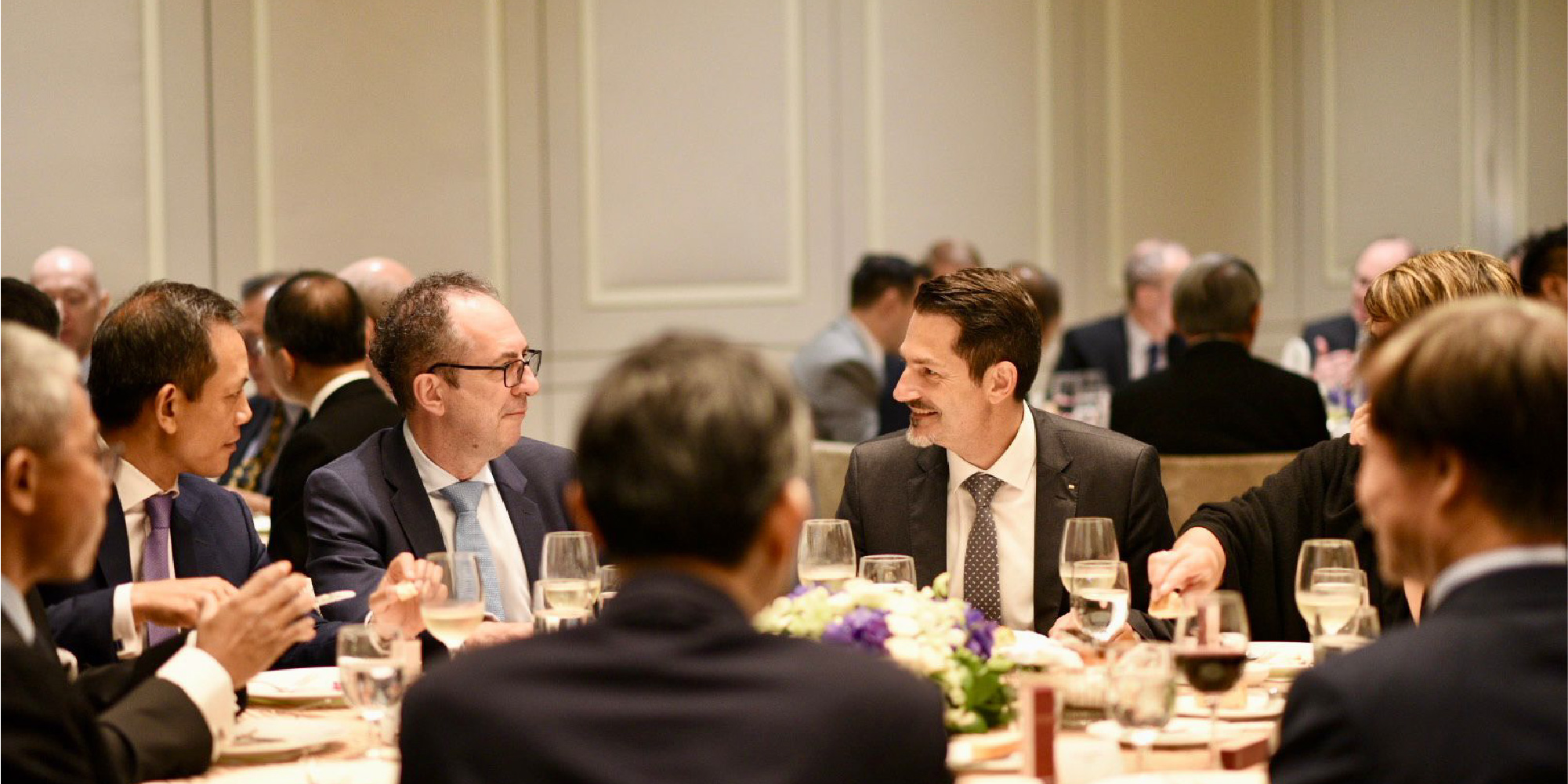
After a two-year absence of in-person celebrations, TUM Asia held its first alumni dinner event, followed by a closed-door dinner at The Fullerton Hotel in appreciation of all its governmental, industry and university partners who have journeyed with TUM Asia throughout these years. Students of TUM Asia were also able to meet and greet TUM President Prof. Dr. Hofmann over luncheon at the campus.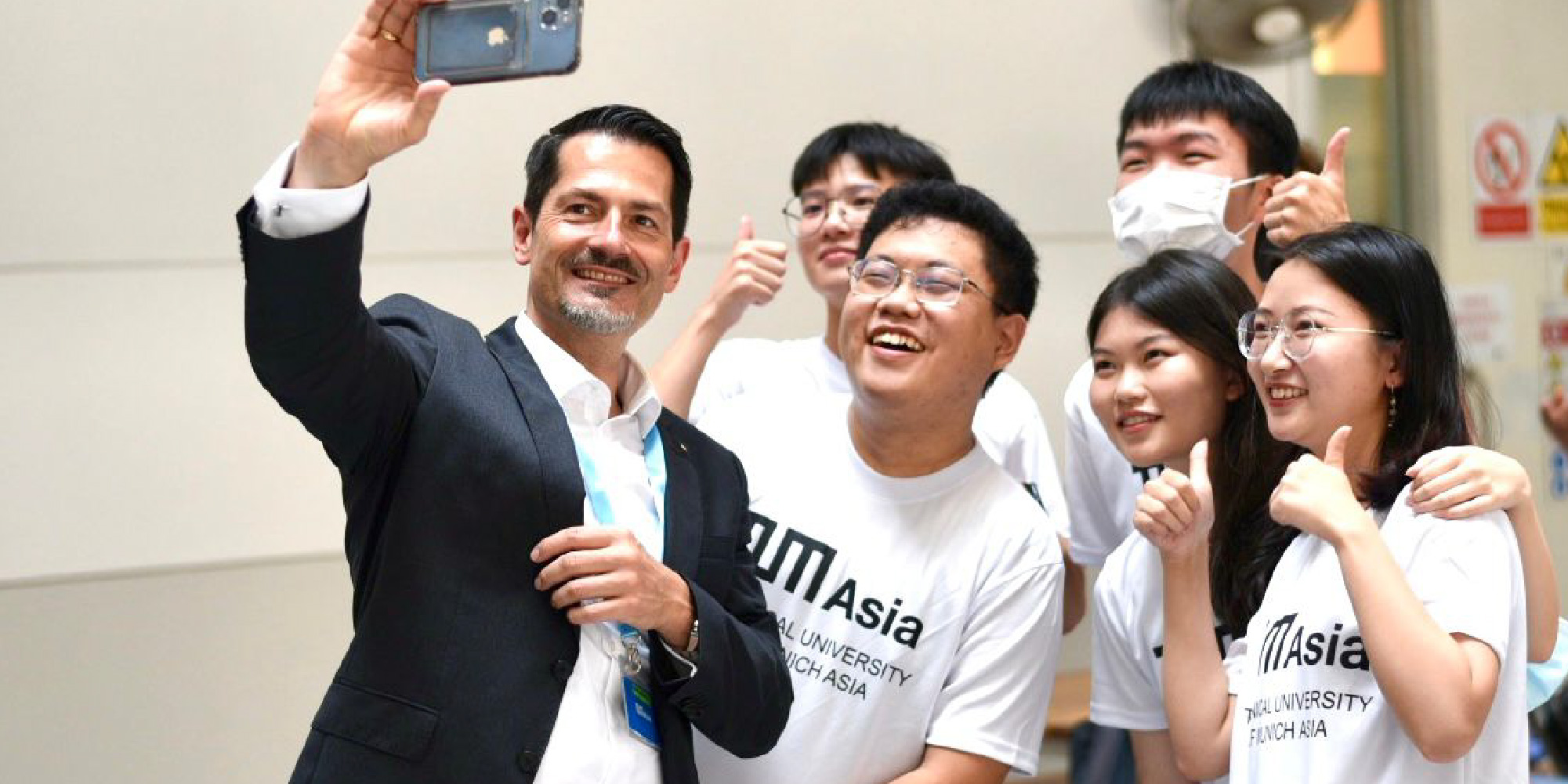
TUM President, Professor Dr. Thomas F. Hofmann, said, “Over the past 20 years, the formula of TUM Asia’s success lies on its collaborative approach of working with global industry leaders, academia and government bodies to provide students with the world-class technical competencies and international perspectives that serve as foundations for innovation and success ahead.”
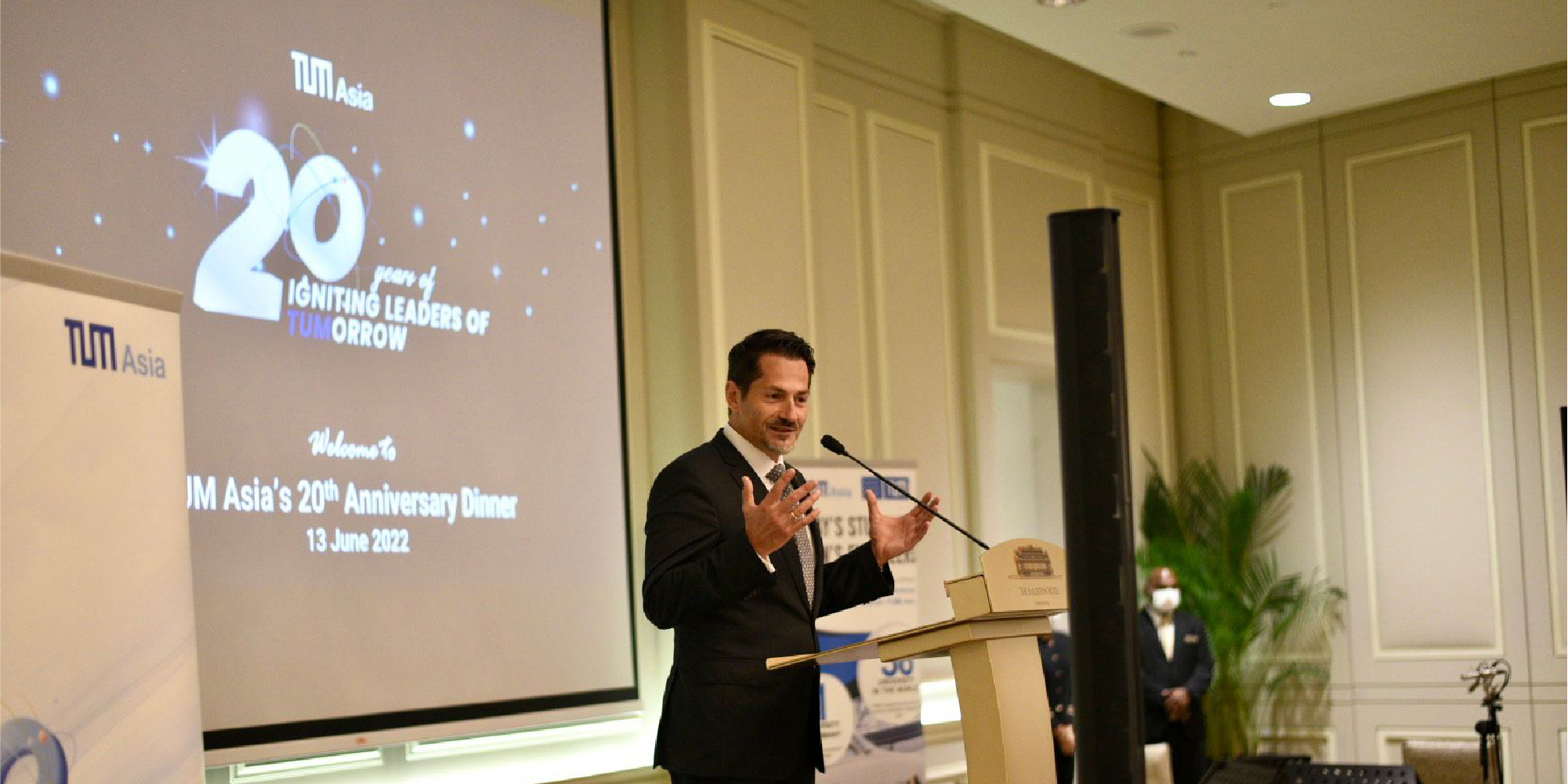 “The COVID-19 pandemic marks one of the most devastating health crises in our times, but the remarkable speed in which vaccines were developed illustrates the power of our generation to co-innovate through the diversity of thought and multi-disciplinary collaboration among government leaders, scientists and academia to solve some of the most complex global challenges. As we embark on the next chapter of TUM Asia’s story, we look forward to co-create in areas of sustainability and food security,” TUM President Hofmann continued.
“The COVID-19 pandemic marks one of the most devastating health crises in our times, but the remarkable speed in which vaccines were developed illustrates the power of our generation to co-innovate through the diversity of thought and multi-disciplinary collaboration among government leaders, scientists and academia to solve some of the most complex global challenges. As we embark on the next chapter of TUM Asia’s story, we look forward to co-create in areas of sustainability and food security,” TUM President Hofmann continued.
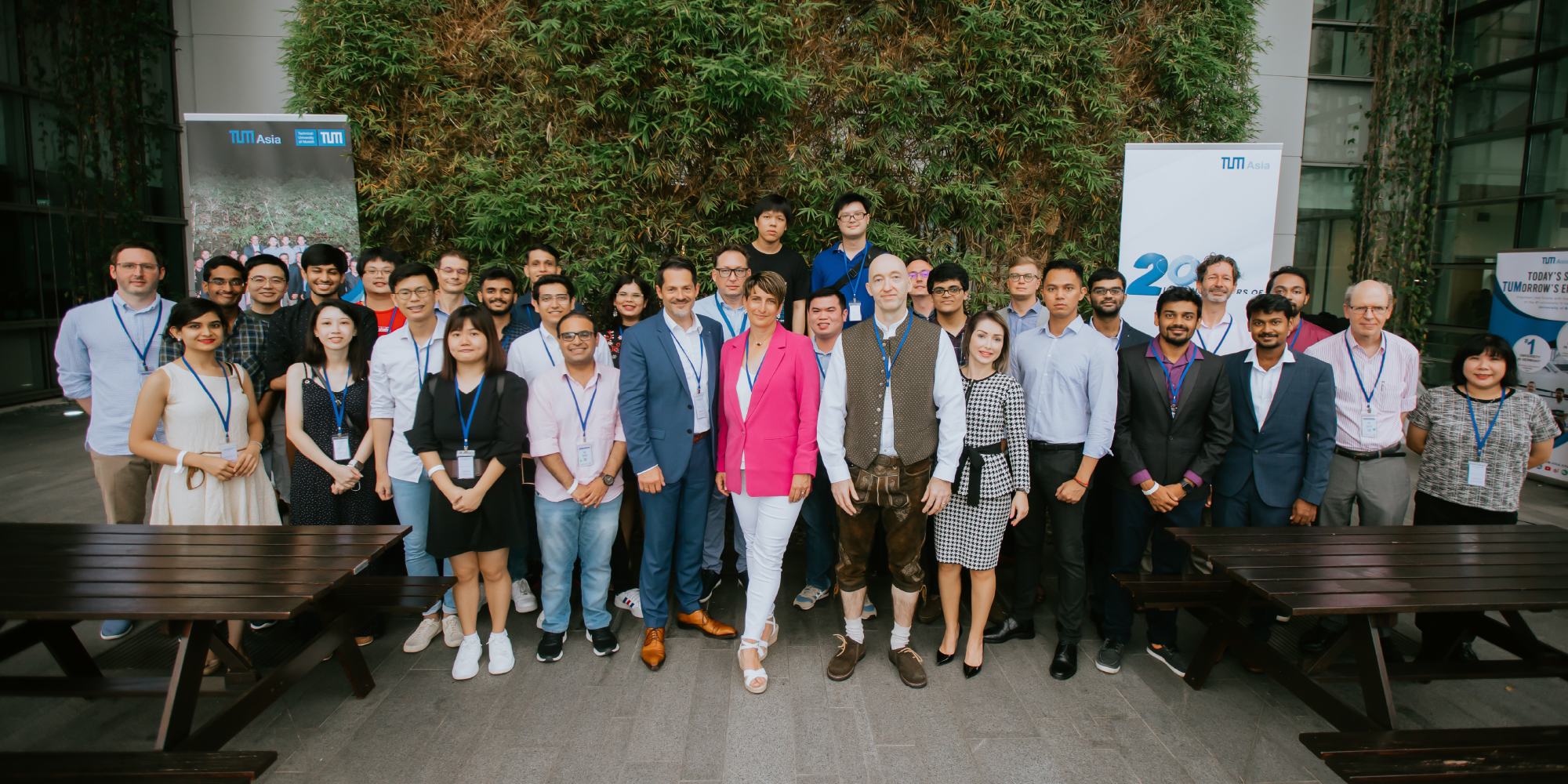 TUM Asia’s Managing Director, Dr. Markus Wächter, said, “As a university with more than 150 years of history in higher learning and 20 years of history in Singapore, TUM Asia has developed deep know-how and established decades-long connections rooted in local cultural contexts to effectively prepare students for what the future holds in a globalised world. In the next arc of TUM Asia’s journey, we look forward to harnessing unique opportunities with our partners to provide outstanding learning experiences that go beyond disciplinary and regional boundaries while generating technological breakthroughs.”
TUM Asia’s Managing Director, Dr. Markus Wächter, said, “As a university with more than 150 years of history in higher learning and 20 years of history in Singapore, TUM Asia has developed deep know-how and established decades-long connections rooted in local cultural contexts to effectively prepare students for what the future holds in a globalised world. In the next arc of TUM Asia’s journey, we look forward to harnessing unique opportunities with our partners to provide outstanding learning experiences that go beyond disciplinary and regional boundaries while generating technological breakthroughs.”
Federal President Steinmeier’s TUM Asia visit – the only German university with a presence in Singapore
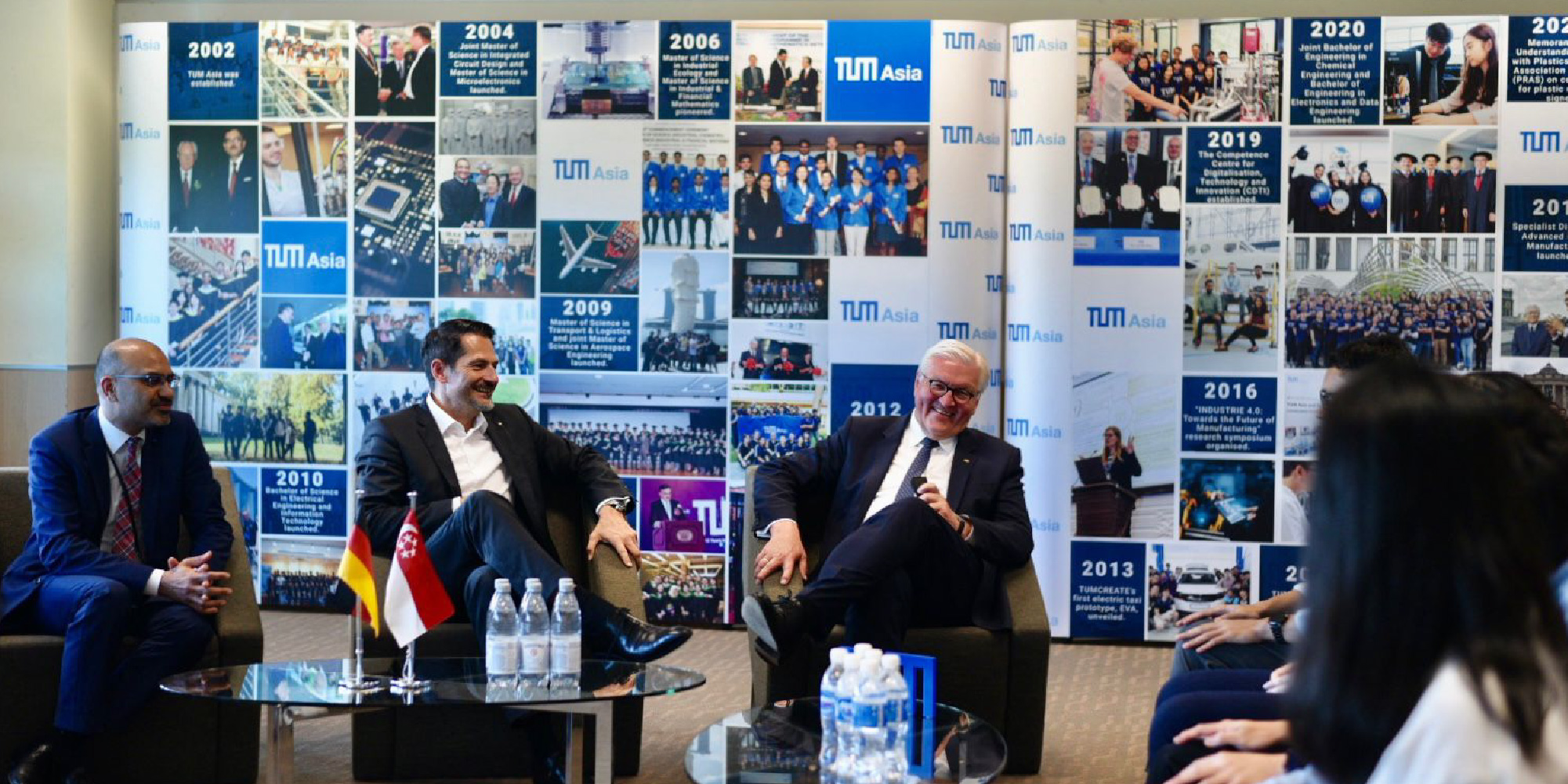 The celebrations of TUM Asia culminated in an exclusive visit by the Federal President of the Federal Republic of Germany, President Frank-Walter Steinmeier. At the campus of TUM Asia, Federal President Steinmeier learned more of the insights and guidelines of the design of taxi stands, bus stops and pick-up drop-off (PUDO) points for the future deployment of Autonomous Vehicles (Avs) in Singapore. In addition, President Steinmeier had the opportunity to speak with students of TUM Asia who hail from various countries of their dreams and aspirations in venturing beyond their home country.
The celebrations of TUM Asia culminated in an exclusive visit by the Federal President of the Federal Republic of Germany, President Frank-Walter Steinmeier. At the campus of TUM Asia, Federal President Steinmeier learned more of the insights and guidelines of the design of taxi stands, bus stops and pick-up drop-off (PUDO) points for the future deployment of Autonomous Vehicles (Avs) in Singapore. In addition, President Steinmeier had the opportunity to speak with students of TUM Asia who hail from various countries of their dreams and aspirations in venturing beyond their home country.
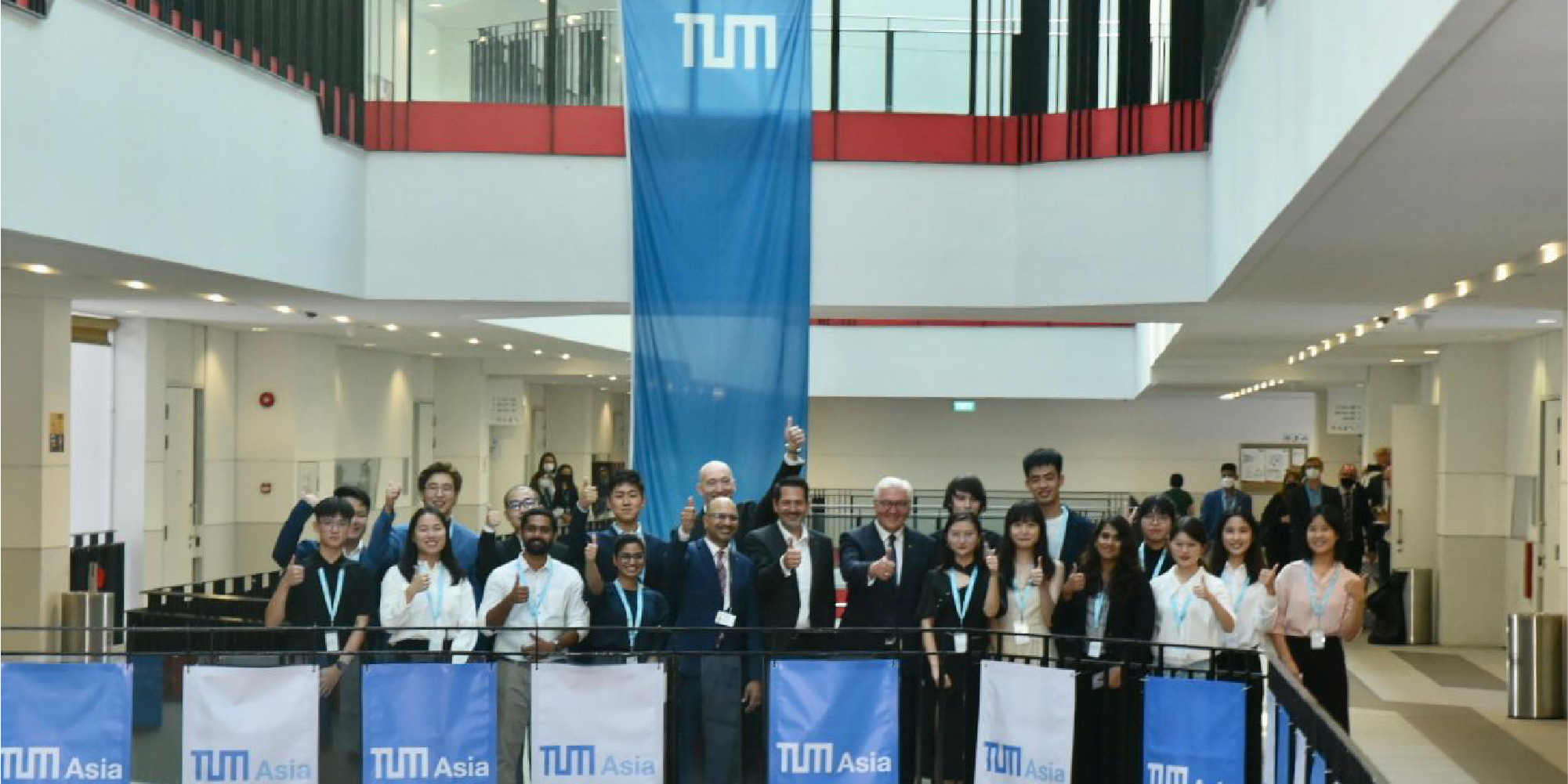 Apart from President Steinmeier’s visit to TUM Asia, President of German Academic Exchange Service (DAAD) had the opportunity to visit the students of TUM Asia who benefitted from the scholarships supported by DAAD, providing more equitable access to high-quality university education.
Apart from President Steinmeier’s visit to TUM Asia, President of German Academic Exchange Service (DAAD) had the opportunity to visit the students of TUM Asia who benefitted from the scholarships supported by DAAD, providing more equitable access to high-quality university education.

TUM Asia legacy: the first foray into uncharted waters
In 2002, TUM Asia was chartered with the vision of bringing German academic excellence closer to people beyond Europe. Despite having no playbook to rely on nor having the same administrative language, TUM Asia was able to cement its global presence within Singapore under the invitation of the Economic Development Board’s Global Schoolhouse Initiative. Its inaugural postgraduate programme – a joint Master of Science in Industrial Chemistry with the National University of Singapore (NUS) – saw close to 20 international students in its first cohort. Since then, TUM Asia has grown to 2,000 graduates from more than 35 countries who found their footholds in their respective arenas.
Today, TUM Asia remains the only German university to have established its global presence in Asia.
Notable Alumnus: Dr. Ronny Sondjaja
One notable alumnus of TUM Asia was Dr. Ronny Sondjaja, from the pioneer cohort of TUM-NUS Master of Science in Industrial Chemistry. Since his graduation, the international exposure gained from the programme has helped equip him in his first role as Product Development Manager for Evonik’s Business Line Oil Additives, whose activities span Germany, Singapore and the USA. Today, Dr. Sondjaja oversees more than a hundred researchers across several business lines in cities such as Mumbai and Shanghai.
The future mobility in Singapore
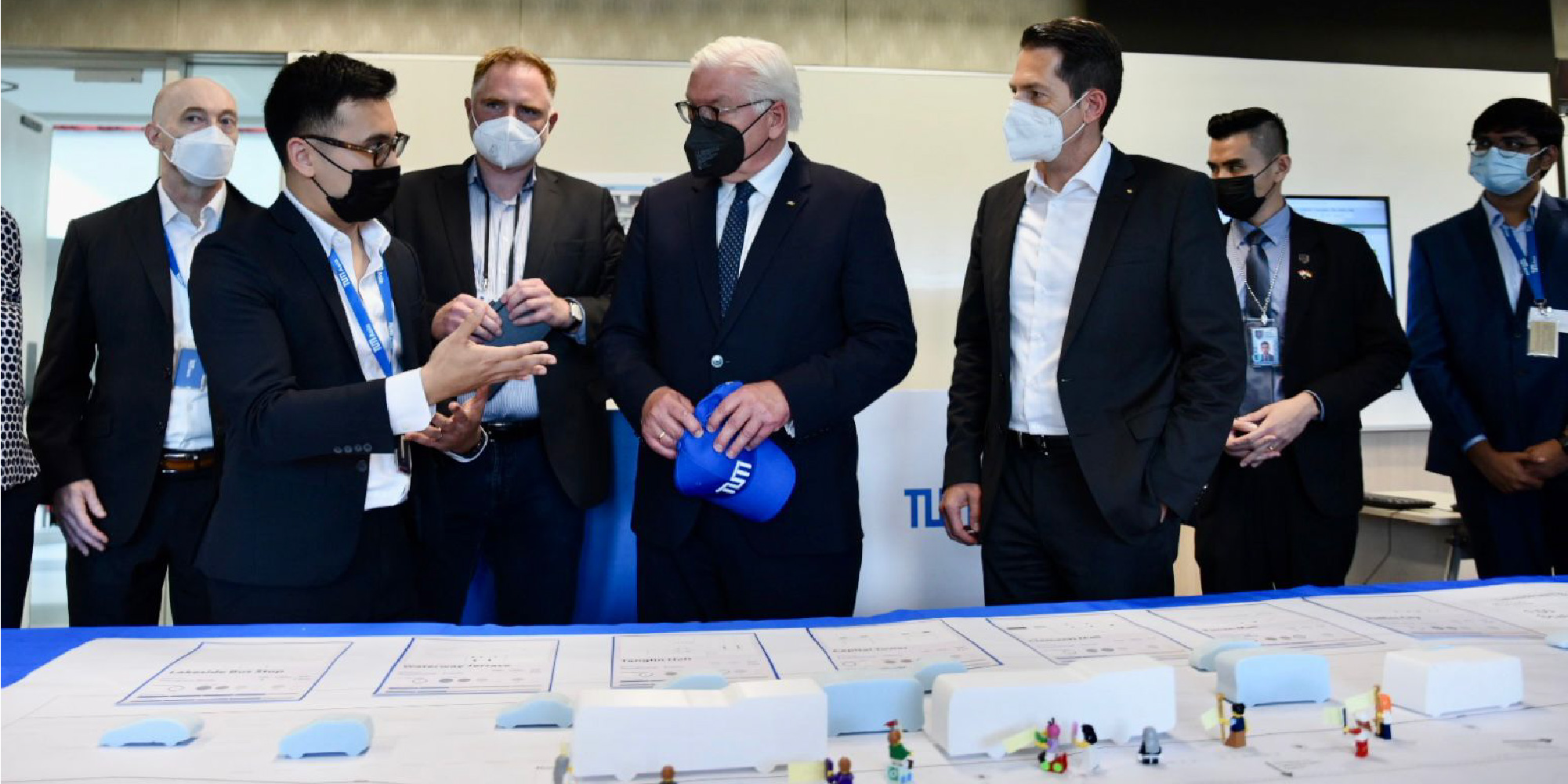 In recent years, TUM Asia has evolved from its original focus of providing German academic excellence in engineering to honing innovators by nurturing creativity and talents through a combination of research and teaching across national boundaries. One of its research programmes spearheaded by TUM Asia is the two-year project under the Land Transport Authority and Urban Redevelopment Authority to research the current and future design of Bus Stops, Taxi Stands, and Pick-Up/Drop-Off (PUDO) points for the upcoming deployment of Autonomous Vehicles (Avs), thus improving the mobility experiences for all users.
In recent years, TUM Asia has evolved from its original focus of providing German academic excellence in engineering to honing innovators by nurturing creativity and talents through a combination of research and teaching across national boundaries. One of its research programmes spearheaded by TUM Asia is the two-year project under the Land Transport Authority and Urban Redevelopment Authority to research the current and future design of Bus Stops, Taxi Stands, and Pick-Up/Drop-Off (PUDO) points for the upcoming deployment of Autonomous Vehicles (Avs), thus improving the mobility experiences for all users.
In a report by KPMG on Autonomous Vehicle Readiness Index in 2020, Singapore topped the index by leading on both the consumer acceptance and policy and legislation pillars. Through the expansion of AV testing to cover all public roads in western Singapore and the deployment of driverless buses from 2022, Singapore is looking at designing its bus stops, taxi stands and PUDO for AVs in preparation for a transition towards AVs. Led by TUM Asia, the PUDO research project is a working collaboration between a larger consortium consisting of the NUS, Nanyang Technological University (NTU) Singapore, bus operators, SBS Transit Tower Transit, AV developers, ST Engineering and Motional to identify the various challenges that AVs would face at current PUDOs and the challenges that users would face when AVs are being deployed at PUDOs. The research team will be providing standardised guidelines for future PUDO designs, validated through simulation and user testing.
From engineering to mobility and food science
Apart from this, TUM Asia is venturing beyond engineering to providing food technology and safety postgraduate programmes to hone more food scientists and technology leaders in the areas of Food Science to strengthen the resilience of the global food system.
About TUM Asia:
Technical University of Munich (TUM) was founded in 1868 and is ranked as Germany’s #1 University. Known as one of Europe’s leading technical universities, TUM has strived to create sustainable solutions for society through excellence in education and research. 17 TUM professors and alumni have also been awarded the Nobel Prize since 1927. Through TUM’s unwavering commitment to the betterment of society, TUM Asia was set up in 2002 as the first academic branch campus of any German university. TUM Asia offers Bachelor’s and Master’s degrees by TUM, in partnership with universities in Singapore. Additionally, TUM Asia now offers a new suite of Executive Education courses in areas such as Industrie 4.0 and Precision Engineering.
As the first German academic venture abroad, TUM Asia is supported by the Singapore Government through the Economic Development Board (EDB), and by the German Government through the Federal Ministry of Education and Research and the German Academic Exchange Service (DAAD).